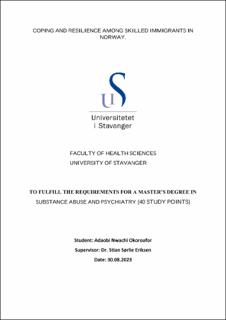| dc.description.abstract | Abstract
Most countries around the world, especially in Europe, have become more diverse, with people migrating to foreign countries in search of asylum from persecution and wars, better education, jobs as well as a better life for themselves and their family. About 281 million people live outside the country of their birth and this accounts for almost 4% of the world`s population. (International organization for migration 2023). Among these individuals, are a sizable number of professionals who have tertiary education such as health professionals, engineers etc.
The purpose of this research was to determine the challenges faced by skilled workers in Norway as well as the strategies used by them to cope. Participants for this research were selected in line with the inclusion criteria such as first-generation migrants with tertiary education who originally are from countries outside the Nordic region. They were interviewed using open-ended, semi-structured questions.
The interviews were transcribed and analyzed carefully.
The result showed that skilled migrants in Norway faced challenges and limitations that were unique to their host country, challenges that were a direct impact of the migration process, and challenges as a result of deficiencies in individual resources. The coping strategies used include planning, establishment of adequate social network, adequate use of individual resources as well as a positive attitude to the integration challenges encountered. The coping techniques utilized was discussed extensively, in line with previous researches and the theoretical perspective of this work .and conclusions drawn. The need for policies that encourage adequate information dissemination to skilled migrants, and the necessity for them to use positive and adaptive coping strategies pre and post -immigration was emphasized | |
